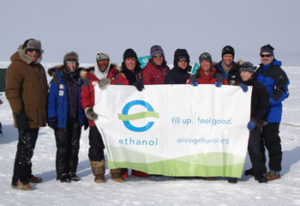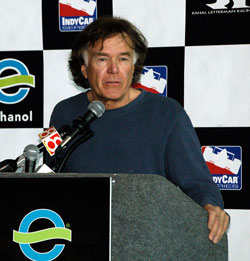EPIC Global Warming Expedition
In an effort to bring attention to the role ethanol can play in the issue of global climate change, the Ethanol Promotion and Information Council joined forces with legendary polar explorer Will Steger for his 2007 Global Warming 101 Expedition.
“There’s never been a more critical time to act. The debate is over,” said Steger when the partnership was announced in January 2007. “Ethanol is available now to consumers. A renewable fuel, it’s a critical part of the solution.”
Only days later, U.S. Energy Secretary Samuel Bodman echoed those same sentiments during an administration press conference when the Intergovernmental Panel on Climate Change report The Physical Science Basis for Climate Change was released.
“Human activity is contributing to changes in the Earth’s climate,” said Bodman. “That issue is no longer up for debate.” Bodman said the Bush administration’s energy policies “go hand in hand with our efforts to address climate change,” with an emphasis on more research for hydrogen, solar power and ethanol production technologies.
“The report findings highlight the need for robust climate research and the development of new technologies to clean our air and deal with global climate change, while maintaining economic competitiveness.”
Ethanol is Cool in the Cold

EPIC’s sponsorship of Steger’s expedition included sales of polar teddy bears wearing ethanol t-shirts
When Steger went looking for sponsors to support his Global Warming 101 expedition, he decided that the ethanol industry would be a natural choice.
“I’ve been talking up the benefits of ethanol for 18 years,” Steger said during an interview at a sendoff event for the team in his hometown of Ely, Minnesota. “I wrote a book in 1988 and in that book I talked about ethanol as being one of the solutions.”
Steger said he really believed if Americans use more ethanol it will make a positive difference in the global climate situation and it has other benefits as well. “It’s best for our economy and our national security and above all supporting our people in the rural areas,” he said.
Steger approached Minnesota-based ethanol plant builder Ron Fagen, president of Fagen, Inc. in Granite Falls. Ron not only jumped at the opportunity, he brought EPIC on board as well.“The world has become acutely aware that the use of fossil fuels is warming our planet at an alarming rate,” said Fagen. “We are honored to support his efforts to document these effects and inspire changes that will halt this trend.”
Ron and his wife Diane were personally supportive of Steger’s mission and traveled to attend sendoff events for the team like the one in Ely where he was interviewed as part of a documentary about the expedition. “We’re doing our part to fight global warming,” Fagen said, bundled in a down coat and mukluks in a make shift studio where the Will Steger Wilderness Center was under construction and the outside temperature was 25 degrees below zero.
“Will Steger’s expedition is fantastic and the timing couldn’t be more perfect,” said Fagan. “Probably 90 percent of the population believe global warming is for real.”
EPIC Expedition Comes to an End
 The Global Warming 101 expedition concluded May 18 in small remote fishing and hunting community of Iqaluit. Fagan and EPIC executive director Tom Slunecka both traveled to welcome the team and congratulate them on a successful journey.
The Global Warming 101 expedition concluded May 18 in small remote fishing and hunting community of Iqaluit. Fagan and EPIC executive director Tom Slunecka both traveled to welcome the team and congratulate them on a successful journey.
“Most people wouldn’t think that there’s a connection between biofuels and the Arctic circle,” Slunecka said. “But as we’ve discovered, ethanol’s ability to reduce harmful gases that contribute to global warming is dramatic, and there’s no more dramatic place to see it than to go to the North Pole.”
Slunecka talked about some of the changes seen by the Inuit. “The elders in the tribes have seen a large change in insects, birds and plant life now being introduced in the region,” he said. “With the warming climate, they are very concerned about new diseases being introduced that will ultimately affect everyone who lives in the region.”
 Just a week later, Steger was the star attraction at the Ethanol Summit held for the media prior to the 91st Indianapolis 500, the first to run on 100 percent ethanol.
Just a week later, Steger was the star attraction at the Ethanol Summit held for the media prior to the 91st Indianapolis 500, the first to run on 100 percent ethanol.
Narrating a slide show of his various expeditions across frozen ice lands in Antarctica, the North Pole and the Greenland ice cap, Steger spoke of temperatures 30 degrees below freezing with 30 mile an hour winds where he witnessed evidence of significant climate change causing large remnants of ice from the last ice age to break up and begin to melt. “The diminishing summer sea ice suggests the earth is experiencing unnatural climate changes,” said Steger.
“We’ve already risen about a degree or so, which doesn’t seem like much, but that rise will continue with all the carbon we’re putting into the atmosphere right now,” said Steger in an interview at the Ethanol Summit. “That’s why we’ve got to take seriously the solutions, things like ethanol and other biofuels.”
“I think the United States is taking the leadership in technology for biofuels,” Steger continued. “I think Americans need an issue like global warming and biofuels to bring the country together.”

